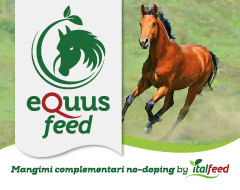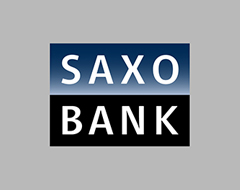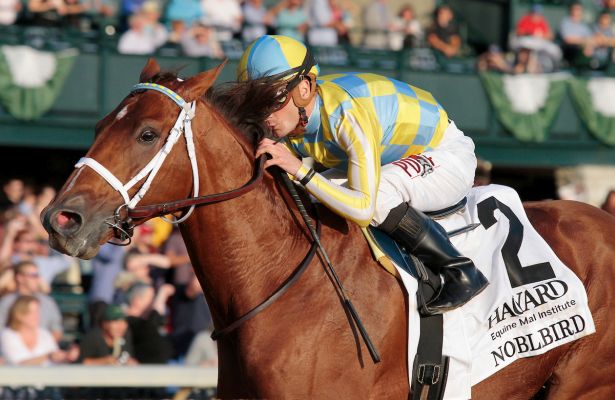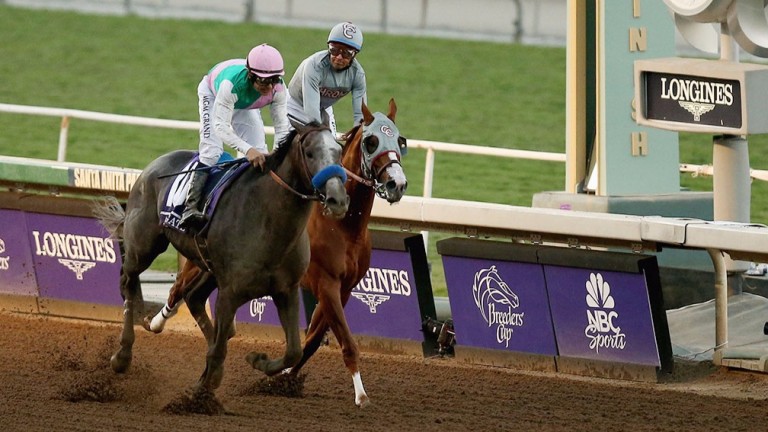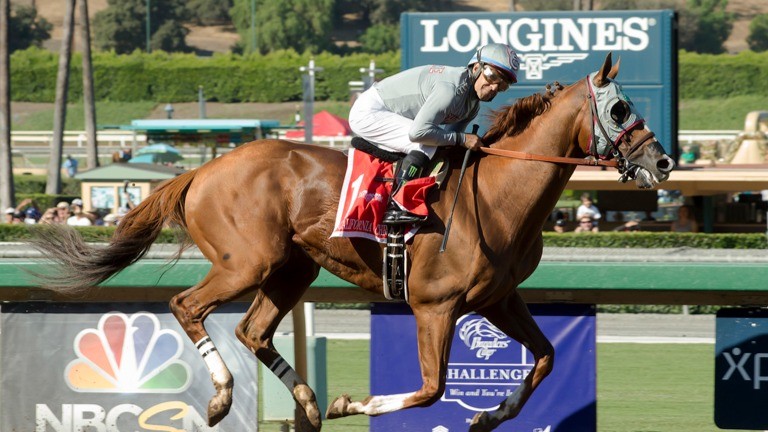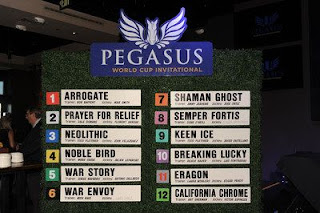BE PART OF HISTORY
January 28th, 2017
Reserve your place at the inaugural Pegasus World Cup Invitational!
The Stronach Group’s premier entertainment destination, Gulfstream Park, in Hallandale Beach, Florida, will delight fans, old and new, with exceptional food and fashion, unique on-site experiences and, of course, world-class thoroughbred horse racing!
ABOUT THE PEGASUS WORLD CUP
The Pegasus World Cup Invitational is the world’s richest thoroughbred horse race! The innovative Pegasus World Cup Invitational, to be contested at 1 1/8 miles on the dirt, is restricted to 12 horses. Twelve owners have reserved a spot in the starting gate for $1 million USD.
BE TREATED TO AN UNFORGETTABLE EXPERIENCE
Pegasus World Cup Invitational guests will be treated to an unforgettable experience at Gulfstream Park. Each one of Gulfstream Park’s venues will offer a unique vantage point to be part of the entertainment, luxury and spectacle of this world-class event.
STAKEHOLDERS
The Pegasus World Cup Invitational Stakeholders represent a group of individuals and owner groups passionately committed to elevating the sport of thoroughbred horse racing. Having purchased a spot in the starting gate for $1 million USD each, The Pegasus World Cup Invitational Stakeholders, together with The Stronach Group, are on the leading edge of an industry game-changing catalyst to modernize the sport and engage a new generation of fans.
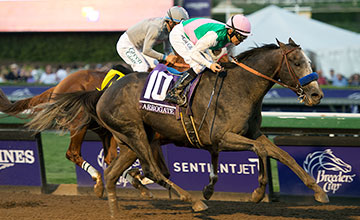
Arrogate: just gets the better of California Chrome in the Classic
PICTURE: Edward Whitaker (racingpost.com/photos)
Arrogate ‘right on schedule’ for Pegasus
USA: Trainer Bob Baffert declared that Arrogate is “right on schedule” for the $12 million Pegasus World Cup and a rematch with California Chrome, after the Breeders’ Cup Classic winner was put through a six-furlong workout at Santa Anita on Sunday.
The Pegasus World Cup – which takes place at Gulfstream Park on Saturday, January 28 – is the world’s richest race and is set to feature the two highest-rated horses in the world in Arrogate and California Chrome.
Arrogate has not raced since memorably beating California Chrome in the Breeders’ Cup Classic in November, and was withdrawn from his intended prep run in the San Pasqual Stakes earlier this month due to a wet track. However, Baffert has managed to get a couple of solid workouts into Arrogate and the trainer expressed his delight after the latest six-furlong gallop, which was completed in 1:12.29.
‘Really impressed’
Baffert said: “He went really well. Every work he is progressing and getting closer. Today he was really picking it up – he was clicking right along.
“I couldn’t be more happy right now. He’s right on schedule. Today what I saw I was really impressed with…I’m really happy with the way he went.”
The trainer added: “We’re all getting excited about it [the Pegasus World Cup] now. I don’t want to jinx myself but everything looks fantastic.”
California Chrome, who is set to retire after the Pegasus, heads the big-race betting at 5-4. Arrogate can be backed at 6-4, while it is 12-1 bar the two.
Noble Bird under consideration for Pegasus World Cup
-
January 15, 2017 5:52 AM
California Chrome Works in Preparation for Pegasus
Source: Gulfstream Park
California Chrome, the 2014 Horse of the Year and a finalist for the 2016 Horse of the Year award, breezed five-eighths of a mile on Saturday morning at Gulfstream Park in preparation for the inaugural $12 million Pegasus World Cup on Jan. 28.
Ridden by regular exercise rider Dihigi Gladney, California Chrome worked for the first time since arriving at Gulfstream on Jan. 6 and drew a nice crowd that lined up along the apron and on the backstretch to catch a glimpse of the superstar.
California Chrome drilled the five-eighths of a mile in 1:00.72, according to Equibase, in a workout that pleased Alan Sherman, son of and assistant to trainer Art Sherman.
“I’m really happy with that work. The track was a little deep, and he covered the ground well. I couldn’t be happier with him,” Alan Sherman said. “He just goes about his business. He loves to train.”
Gladney said Chrome enjoyed the attention of his adoring fans.
“He’s been training early in the morning [before dawn], but he’s the type of horse when you take him out in the daylight, he looks around to see what’s going on,” Gladney said. “By the time I turned him around and he started jogging, he saw the crowd. He knows this is business. He loves the show.”
Eclipse Sportswire was on hand to photograph the morning’s action with a terrific slideshow from Gulfstream.


SLIDESHOW: Final Prerace Friday for Retiring Star California Chrome
THE LIFE, January 27th, 2017

Eclipse Sportswire was on hand Friday at Gulfstream Park to capture some dazzling images from the final non-race day of activity for two-time Horse of the Year and future Hall of Famer California Chrome, who will be retired after competing Saturday in the $12 million Pegasus World Cup.


Art Sherman Diary: ‘We Are Going to Win the Pegasus’
THE LIFE, January 26th, 2017 BY Tom Pedulla
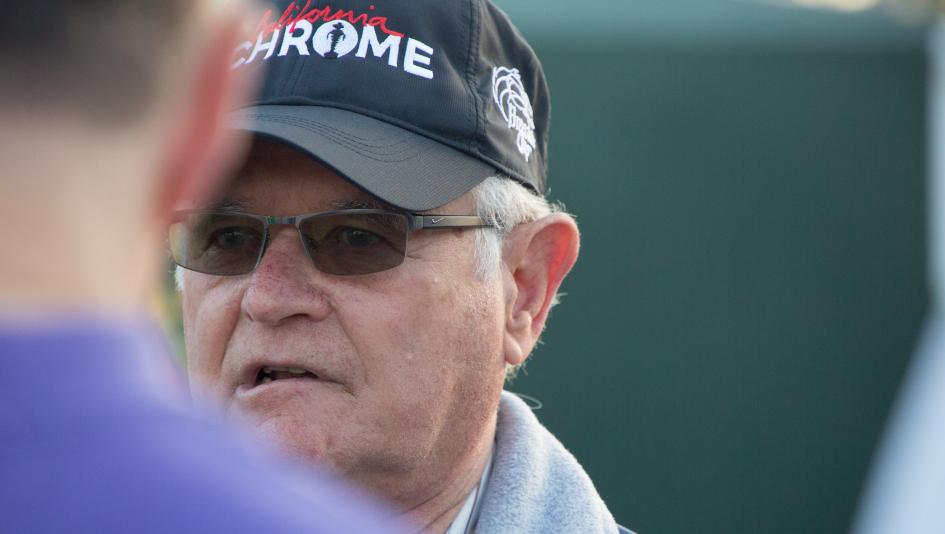
Art Sherman, whose diary took followers of America’s Best Racing through California Chrome’s Triple Crown bid in 2014, agreed to one last installment with Tom Pedulla as Chrome closes his legendary career in the inaugural $12 million Pegasus World Cup Invitational on Saturday at Gulfstream Park.
I know this is a big statement, but I think this is the best I’ve ever had California Chrome, physically and mentally. He’s just a lot of horse right now. Physically, he looks great. He’s just matured into quite a beast. I can tell he is sitting on a big race.

He will have to be since we were unlucky at the draw, getting stuck on the far outside in post 12. It’s a pretty short run into that first turn at Gulfstream Park, so Victor Espinoza will have to ask Chrome a bit getting out of there. Fortunately, Chrome is pretty much a push-button horse. He has the speed to clear at least half the field in the early going.
I suspect we will be a bit wide around the first turn. That is OK as long as we can stay out of trouble, which we should, and have a clear run at it. Arrogate drew the rail. I look for him to roll out of there. There are a couple of horses with the ability to push Arrogate along. If no one does, we will get to him as quickly as possible. We’re not going to let him just gallop on the lead, I promise you that. We’ll be dogging him by the three-eighths pole, I’m quite sure.
One of the best aspects of Chrome is his willingness to respond to whatever is needed. If that means being on the lead, he’s there. If it means sitting off the pace, he relaxes. He is such a classy horse. He has the best attitude of anybody on the team. Nothing bothers him. We’ve been all over the world with him and he took everything in stride.
And did I mention he’s fast? That helps. I think back to some of his biggest races, the Santa Anita Derby, the Pacific Classic and even that last race, when he set a track record at Los Alamitos. With his awesome turn of foot, he made everyone else look as though they were standing still.
I think the Pegasus is a great addition to the racing calendar. In only its first year, it already is creating a great deal of interest. Chromies are arriving from all parts of the country. They are good people, a lot of fun to be around. They sure contributed to this wonderful journey.
Chrome loves the attention. When I saddle him, there are so many eyes on us that I often feel as though we are the only horse in the paddock.

I am filled with emotion as I look to the end of Chrome’s racing career. I watched him being bathed the other day and it hit me. ‘Wow, I won’t be able to see him anymore.’ Sure, we’ll visit him at Taylor Made Farm in Kentucky, but it won’t be the same.
I have a room full of trophies, a golden whip from the Dubai World Cup, things I never thought would come my way. Through the years, my clients would pay $50,000, $70,000 for a horse. That was a lot of money. I was grateful for their business and their trust in me.
Chrome, bred for a total cost of $10,500 and with earnings of $14.5 million and looking for more, shows great horses can come from anywhere. But it sure helps to have major players in the game as owners. Thanks to Chrome, I have one now in Kaleem Shah. I hope we will do well together. I think we will.
I may be 79, but I am not too old to continue to dream big and to think about what a thrill it would be to train some of Chrome’s babies, to see if they would have the same class and, of course, that speed that makes others look as though they are standing still.
We still have unfinished business with Chrome. That loss to Arrogate in the Breeders’ Cup Classic has been eating at me since it happened.
We are going to win the Pegasus. I have all the confidence in Chrome. He is going to show everyone who is number one.
LA GRANDE SFIDA SI AVVICINA. CALIFORNIA CHROME (STECCATO 12) ED ARROGATE (STECCATO 1) SI SFIDERANNO NELLA PEGASUS WORLD CUP DOMENICA 28 GENNAIO, LA DIRETTA ALLE ORE 00.00 DI SABATO (ORA ITALIANA, LIVE SUL CANALE 220 SKYTV) // DI SEGUITO TUTTO SUI DUE CAMPIONI, I PARTENTI, LE QUOTE, LE INFORMAZIONI E LE INTERVISTE
Arrogate has been officially confirmed as the world’s best racehorse of 2016, with his rating of 134 matching the figure achieved by 2015 champion American Pharoah, who was also trained by Bob Baffert.
Arrogate produced his defining performance in the Breeders’ Cup Classic, and you have to go back to 2012 – when the imperious Frankel was on the scene – to find a performance rated higher than his half-length beating of seven-time Grade 1 winner California Chrome.
Second on the list with a rating of 133 is California Chrome, who enjoyed a stellar year and put up top-class performances in winning the $1 million TVG Pacific Classic and Awesome Again Stakes.
California Chrome may have lost out to Arrogate at the Longines World’s Best Racehorse ceremony in London on Tuesday but he was named American Horse of the Year at the prestigious Eclipse Awards last week.
The pair will leave behind the battle for ceremonial honours and resume competition on the track in the inaugural running of the $12 million Pegasus World Cup – the world’s richest horse race – at Gulfstream Park on Saturday.
International dominance
The highest-rated turf performer is star Australian mare Winx, who earned a rating of 132 through her eight-length beating of Hartnell in the William Hill Cox Plate during the Melbourne spring carnival. To put Winx’s achievement into context, Black Caviar, who retired in 2013 as a national hero and unbeaten after 25 starts, also attained a career-high figure of 132.
Only three European-trained horses feature among the top ten in the world, with Jean Claude-Rouget’s Almanzor, who achieved a rating of 129 through his wins in the Qipco Irish Champion Stakes and Qipco Champion Stakes, faring best by a significant margin.
Found and Postponed were the other two European-trained horses to break into the top ten and they share the honour of being the highest-rated horses from Britain or Ireland. However, their rating of 124 compares poorly against those who have previously taken that crown.
It may have been an underwhelming season for European-trained horses on the whole, but with a rating of 129 Almanzor is an up-to-scratch flagbearer, rated just 1lb lower than last year’s Arc and Derby hero Golden Horn and higher than any other European-trained colt since 2013.
Race ratings
It’s easy to make a case for the Breeders’ Cup Classic being the most exciting contest of 2016 from a visual viewpoint, but it was also the world’s best race from a ratings perspective.
The average rating of the first four home in the Classic was 125.25, while the Qipco Irish Champion Stakes had the second highest average with 124.75.
There was a strong crop of Japanese colts in 2016, and the Satsuki Sho (Japanese 2000 Guineas) and the Tokyo Yushun (Japanese Derby) were the best three-year-old races in the world with a rating of 119.75, half a pound ahead of the Investec Derby.
There is also an annual competition to recognise the top jockeys throughout the world, which was won by Ryan Moore. Moore was presented with his prize for the Longines World’s Best Jockey at a ceremony last month.
California Chrome regains US Horse of Year accolade
California Chrome was named American Horse of the Year for the second time on Saturday night at the annual Eclipse Awards ceremony, getting the better of his Breeders’ Cup conqueror Arrogate in the vote for the nation’s most prestigious racing award.
The equine Oscars took place at Gulfstream Park, where battle will be rejoined between California Chrome and Arrogate on Saturday in the Pegasus World Cup.
Arrogate is also likely to have been identified as world champion before then at the World Thoroughbred Racehorse Rankings, due to be revealed in London on Wednesday.
However, California Chrome – who had also won the award in 2014 – outpolled Arrogate by 202 votes to 40 in the ballot that really matters at the Eclipse Awards, which represent the pinnacle of achievement and define the de facto champions of the sport. There is no direct corollary in Europe – the Cartier Awards, for instance, fail to carry anywhere near as much clout.Songbird received five votes for Horse of the Year, while there was one for Ballydoyle’s Breeders’ Cup-winning globetrotter Highland Reel.Trained in California by veteran handler Art Sherman, California Chrome won seven of his starts last year including the Dubai World Cup and a five-length defeat of subsequent Distaff heroine Beholder in the Pacific Classic.
He duly became only the second horse to regain the Horse of the Year title since the Eclipse Awards began in 1971. John Henry was the other, winning in 1981 and 1984.
California Chrome, Arrogate and Songbird all won divisional titles earlier in the evening, with California Chrome the unanimous choice among the 248 voters as champion older dirt male, while Songbird was also unanimous among three-year-old females.
Arrogate polled 243 votes as three-year-old male.There was little sign of European success as Highland Reel took second place behind Flintshire – whom he beat at the Breeders’ Cup – in the male turf category while Found and Queen’s Trust took the minor placings as Royal Ascot winner Tepin deservedly retained her title as female turf champion.Tepin’s trainer Mark Casse was responsible for two champions as Kentucky Derby favourite Classic Empire took the two-year-old male award after his Breeders’ Cup Juvenile triumph; Bob Baffert also had two winners, with Drefong topping the sprint category to join Arrogate.Rawnaq, formerly trained in both Britain and Ireland, was voted champion steeplechase horse after a season in which he won the American Grand National Hurdle under Ruby Walsh.
Thanks to the exploits of Arrogate, Khalid Abdullah’s Juddmonte operation was named leading owner while Chad Brown, who trained Flintshire, won his first title as outstanding trainer.
Brown also topped the prize-money list for the first time in 2016 to confirm his rise to the top of the training ladder. Javier Castellano extended his winning streak among jockeys to four. Other human awards went to WinStar Farm (breeder) and Chad Luis Ocasio (apprentice jockey).
A special Eclipse Award of Merit for lifetime achievement was presented to journalists Andrew Beyer and Steven Crist.
Finest City (Ian Kruljac/Mike Smith), voted champion female sprinter after her Breeders’ Cup victory, kicked off her 2017 campaign with an impressive victory in the Grade 2 Santa Monica at Santa Anita on Saturday.
Horse of the Year: California Chrome
Older dirt male: California Chrome
Older dirt female: Beholder
Three-year-old Male: Arrogate
Three-year-old Filly: Songbird
Two-year-old Male: Classic Empire
Two-year-old Filly: Champagne Room
Male sprinter: Drefong
Female sprinter: Finest City
Male turf horse: Flintshire
Female turf horse: Tepin
Steeplechase horse: Rawnaq
Owner: Juddmonte Farms
Breeder: WinStar Farm LLC
Jockey: Javier Castellano
Apprentice jockey: Luis Ocasio
Trainer: Chad Brown
Key data
America: Sorteggiati gli steccati della Pegasus World Cup, California parte con il 12, Arrogate dall’1. Diretta anche in Italia
California Chrome è uno che se l’è sempre dovuta sudare la pagnotta. E sarà così anche nell’ultimo appuntamento della sua carriera. Lunedì notte sono stati resi noti gli schieramenti ufficiali per la disputa della prima edizione della Pegasus World Cup G1 da $12 milioni in palio, che verrà concessa live anche da At The Races e straordinariamente anche dai canali italiani sul 220 di Sky sabato notte intorno alle 00 ora italiana.
Il favorito dell’antepost partirà da uno scomodo stallo 12, all’esterno di tutti, mentre il suo rivale più accreditato, il controfavorito (nonostante ad inizio betting fosse lui favorito) Arrogate, partirà dall’1 di steccato. Opposti, lontani, ma molto vicini nel doversi curare. Il commento di Art Sherman è stato questo all’estrazione del numeretto: “Oh Gosh, here we go again!” letteramente “ci risiamo!”. Ma poi non ha cercato scuse, dicendo di sperare in una buona partenza che possa farlo andare vicino allo stecco in pochi metri.
Numeraccio, non c’è che dire, e pensare che, secondo quanto ricordano le cronache locali, in questa stagione a Gulfstream nessun cavallo con uno steccato oltre il 7 ha mai vinto su distanze superiori al miglio da quando poi il raggio della curva è stato esteso nel 2006. Si ma Chrome è Chrome, non è uno qualsiasi. Certo che uno steccato del genere fa pensare ad un duello anticipato tra lui ed Arrogate, il giovane, che partirà dall’interno. Si scatenerà subito la bagarre? Non lo sappiamo, sappiamo solo che al sorteggio ci sono state varie dichiarazioni: Sempre Sherman ha detto che gli sarebbe piaciuto allenarlo ancora un anno, perchè migliora sempre e si è sorpreso di come ogni lavoro tocchi dei picchi ancora più alti. Bob Baffert ha elogiato il Pegasus creator Frank Stronach per il concetto che ha rivitalizzato “the moribund US winter scene”, che dice tutto praticamente. Tra le novità c’è quella anticipata ieri, con Gun Runner ufficialmente ritirato a causa di analisi sballate, ma a sostituirlo un campo partenti assolutamente degno con 6 vincitori di G1 in pista. In caso di inconvenienti ci sono 3 riserve pronte a subentrare: Stanford in caso non corra Arrogate, Sea Raven in caso non corra Breaking Lucky e Madefromlucky in caso non corra California Chrome. Ma sono tutti dubbi dell’ultim’ora, al momento non previsti. Qui sotto ecco il campo partenti definitivo con i cavalli ordinati per numero di steccato, nome, monta e quota del morning-line.
PEGASUS WORLD CUP G1 – $12 milioni
1 Arrogate Mike Smith 7-5
2 Prayer For Relief Florent Geroux 50-1
3 Neolithic John Velazquez 30-1
4 Noble Bird Julien Leparoux 25-1
5 War Story Antonio Gallardo 50-1
6 War Envoy Luis Saez 50-1
7 Shaman Ghost Jose Ortiz 20-1
8 Semper Fortis Tyler Gaffalione 50-1
9 Keen Ice Javier Castellano 12-1
10 Breaking Lucky Luis Contreras 25-1
11 Eragon Edgar Prado 50-1
12 California Chrome Victor Espinoza 6-5
PUBBLICATO DA GABRIELE CANDI A MARTEDÌ, GENNAIO 24, 2017
Arrogate Celebrated as Longines World’s Best Racehorse
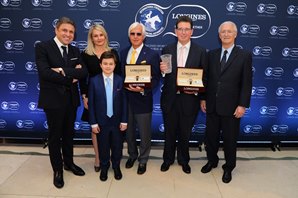
Juddmonte Farms’ Arrogate was bestowed with the accolade of 2016 Longines World’s Best Racehorse at a glittering ceremony in London Jan. 24. The 4-year-old colt, trained by Bob Baffert, prevailed over California Chrome and the Australian mare, Winx, for an award determined strictly on racing merit.
A delighted Baffert was present to collect the award, as he had been 12 months earlier when American Pharoah won the same accolade.
“Having the Longines World’s Best Racehorse is quite an honor,” he said. “After getting it last year with American Pharoah, I know what kind of presence Longines has in racing. It is a huge honor to get this award two years in a row.”
Bred in Kentucky by Clearsky Farms, Arrogate earned a rating of 134 by a panel of handicappers who gathered under the auspices of the International Federation of Horseracing Authorities. His half-length defeat of California Chrome in the Nov. 6 Breeders’ Cup Classic (G1) saw him rated one pound ahead of California Chrome, with Winx, an eight-length repeat winner of Australia’s premier weight-for-age race, the William Hill Cox Plate (G1), rated one further back with 132.
Connections of all three horses were on hand to accept commemorative gifts from Longines.
Tangentially, Arrogate’s Breeders’ Cup Classic triumph helped to propel the 10-furlong contest into first place among the world’s elite races. At 125 1/4, the Classic accrued the highest average rating combining the first four horses to finish (Arrogate, California Chrome, Keen Ice, and the Baffert-trained Hoppertunity). This placed it a half-point ahead of a three-way tie for second place, which was shared by the QIPCO Irish Champion Stakes (G1), the $1 Million TVG Pacific Classic (G1) and the Cox Plate.
Craig Fravel, president and CEO of the Breeders’ Cup, was on hand to pay his own tribute.
“Arrogate showed all of us what he was made of in the Breeders’ Cup Classic,” he reflected. “That is what this horserace is intended to do—identify champions.”
Behind Scenes of Arrogate’s World’s Best Ranking
There was a celebratory mood among invited guests at Claridge’s Hotel, a London landmark. In their number was Her Majesty the Queen’s grandson Peter Phillips, brother of Zara, who was part of the Great Britain equestrian eventing team that won the silver medal at the 2012 Olympic Games in London.
Baffert, for his part, was generous toward the horses vanquished by Arrogate.
“It was special to beat a horse like California Chrome (in the Classic), who has beaten me more times than I have beaten him,” he said.
A Q&A With Juddmonte Farms’ Teddy Grimthorpe
And after seeing footage of Winx winning her 13th straight race in the Cox Plate, he added: “This Winx —what a racemare she is.”
Although disappointed, Winx’s co-owner Debbie Kepitis, was visibly moved during the ceremony.
“Winx is very special,” she said before her emotions engulfed her. “I’m sorry, I’m lost for words. It’s amazing to have our wonderful horse recognized like this.”
Trainer Chris Waller was equally proud.
“The pinnacle would be for Winx to win a third Cox Plate, and after that, we will take her onto the world stage.”
He then quipped: “I guess we’ve got to race her on dirt to try and win the Breeders’ Cup Classic if we want to be the best horse in the world.”
Consolation for Winx’s connections is that she closed 2016 as the high-rated turf horse in the world, and the high-rated filly or mare.
Kelly Martin, daughter of California Chrome’s co-breeder and co-owner, Perry Martin, paid heartfelt tribute to the 6-year-old.
“He has taken us on a wild ride,” she said of the chestnut. “My personal favorite memory was when he won the Dubai World Cup (G1, Sponsored by Emirates Airline, in March). It took my breath away; it blew my mind.”
Baffert was visiting London for the first time 12 months ago. He fell in love with the city, and confided that an abiding ambition was for him to ride in one of the Royal Carriages that make their way down the home straight before racing at Royal Ascot every day.
“That would be big,” he said. “I watched Ascot on television last year and enjoyed that procession most of all.”
Arrogate Named 2016 Longines World’s Best Racehorse
Among the garlands handed out to Baffert was a Longines watch; he had received another after American Pharoah won the Preakness Stakes (G1) in 2015.
“It was raining that day and the cases were open for the presentation ceremony,” he reflected. “The next time I opened it, the case had got moldy. I had to throw it away.”
But don’t be tempted to feel too sorry for Baffert. Juan-Carlos Capelli, vice president of Longines, teased Baffert from the presentation podium: “I’m thinking: ‘How many watches do you have now?’ Enough to open your own shop.”
After finishing third in his debut in April last year, Arrogate (Unbridled’s Song—Bubbler, By Distorted Humor ) won his next five starts, among them the Travers Stakes (G1) by 13 1/2 lengths in track record time. He races in the green, pink, and white silks of Prince Khalid Abdullah of Saudi Arabia, who has also campaigned a pair of iconic European turf horses in Dancing Brave and Frankel.
A $560,000 yearling purchase from the 2014 Keeneland September yearling sale, Arrogate will square off with California Chrome again on Saturday in the inaugural Pegasus World Cup Invitational Stakes (G1). Arrogate is expected to close his racing career after a repeat bid for the Breeders’ Cup Classic at Del Mar in November.
fonte : Bloodhorse.com
Arrogate, California Chrome Meet Again in Pegasus
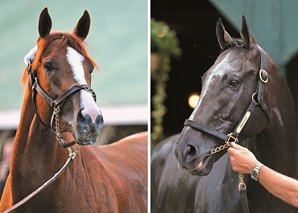
In many ways the entries alone mark an early “mission accomplished” for the first edition of the $12 million Pegasus World Cup Invitational Stakes (G1) as the world’s richest race set for Jan. 28 at Gulfstream Park has attracted the world’s two top dirt horses in training in California Chrome and Arrogate.
Both standout horses picked up hardware for their connections at the Eclipse Awards Jan. 21 as Arrogate was named champion 3-year-old male and California Chrome secured the Horse of the Year honor along with the champion older dirt male trophy. While the chestnut picked up the night’s top honor based on a spectacular overall season, Arrogate scored a victory in the one race where the two met last year when he surged past California Chrome in deep stretch to win the $6 million Breeders’ Cup Classic (G1) in November at Santa Anita Park.
The 2016 Breeders’ Cup Classic was the most lucrative race ever conducted in North America, but the Pegasus will quickly rewrite the record book as North America’s—and the world’s—richest race, surpassing the $10 million Dubai World Cup sponsored by Emirates Airline (G1) in the latter category.
California Chrome, the 6-5 morning-line favorite in the Pegasus, will start from the outside in the field of 12 while Arrogate, the 7-5 second choice, will start from the rail.
“We can’t make any excuses,” California Chrome’s trainer Art Sherman said of the outside draw. “The only good thing I thought about this is that he doesn’t have to be in the starting gate long.”
According to BRISnet.com stats, since the track was reconfigured in 2006 horses who have started from post 12 in 1 1/8-mile races are 1-for-18.
“Chrome is Chrome; he’s got tactical speed,” Sherman said. “I was hoping that we would get closer inside. He will overcome all this, believe me.”
Campaigned by co-breeder Perry Martin and Taylor Made Farm, California Chrome won the 2016 Dubai World Cup, an effort that helped him become the top earner in North American racing history at $14.5 million. A victory Saturday in what is scheduled to be the final time Sherman sends out the two-time Horse of the Year would make the 6-year-old son of Lucky Pulpit the world’s top earner as he would surpass the $19,005,276 collected by Japan’s 2011 Horse of the Year Orfevre.
Juddmonte Farms’ Arrogate shattered records in his stakes debut when he won the Travers Stakes (G1) in track-record time of 1:59.36 for 1 1/4 miles to score a 13 1/2-length victory at Saratoga Race Course. After taking the summer’s top 1 1/4-mile race for 3-year-olds, the son of Unbridled’s Song improved to 2-for-2 at the distance when he won the Breeders’ Cup Classic and gave his trainer, Bob Baffert, a third straight victory in the race following triumphs by Bayern in 2014 (where California Chrome finished third) and American Pharoah in 2015.
Baffert liked the way Arrogate looked in his final serious work before the Pegasus, when he completed six furlongs in 1:12.13 Jan. 21 on a sealed Santa Anita track listed as “wet-fast.”
“He’s getting stronger every week. I wanted to see what I saw today and he’s ready for the big race,” Baffert said after the move. “Now we have to ship and there’s more hurdles, but I love the way he’s training. This horse is so fit. He’s ready for the challenge.”
The Pegasus will see the two champions shorten up a furlong from their Breeders’ Cup Classic efforts. California Chrome has won two of his four dirt starts at the 1 1/8-mile distance with victories in last year’s Awesome Again Stakes (G1) at Santa Anita and a dominating performance there in the 2014 Santa Anita Derby (G1), which set him up for a pair of classic victories.
Arrogate will try the distance for the first time but the five-race win streak he’ll carry into the Pegasus includes the two 10-furlong scores as well as three straight wins at 1 1/16 miles in maiden and allowance tests in Southern California.
Both Southern California-based horses will be starting at Gulfstream for the first time. California Chrome will be making his first start since closing 2016 with a 12-length waltz to victory in the Winter Challenge Stakes at Los Alamitos Race Course. Arrogate will be making his first start since Breeders’ Cup as he was scratched from a planned start in the Jan. 1 San Pasqual Stakes (G2) at Santa Anita because of track conditions after rain fell in the days before that race.
Both Arrogate and California Chrome will figure prominently when the Longines World’s Best Racehorse is announced Jan. 24. The Pegasus’ landing racing’s top two dirt horses in the world recalls the inaugural edition of the Dubai World Cup that attracted Cigar, who fueled a rousing debut to the race in 1996 when he extended his win streak to 14 under the lights at Nad al Sheba.
To help fund the Pegasus purse, The Stronach Group devised a plan in which stakeholders have put up $1 million each for one of the race’s 12 starting slots. That approach has helped ensure full entries in the inaugural Pegasus, despite the presence of Arrogate and California Chrome.
“It’s going to be a great race,” said Frank Stronach at the draw. The race is scheduled to be aired during a 4:30 to 6 p.m. broadcast on NBC.
Baffert thanked the Stronach Group for putting the race together and bringing some added excitement to the racing calendar.
“I think it’s thinking out of the box. It couldn’t have come at a better year when you’ve got the No.1 and No. 2 horses hooked up together,” Baffert said. “It’s very rare that you’ll get that type of a matchup. It’s like a Breeders’ Cup all over again.
“At this time of the year it’s usually really quiet, usually we’re just getting our horses ready for the spring and summer. I think everybody is going to be watching. The $12 million catches a lot of people’s attention. This is Frank Stronach’s dream and I’m proud of being part of it.”
On paper, a horse will have to jump up quite a bit to compete with the top two. In the Breeders’ Cup Classic, California Chrome finished 10 3/4 lengths ahead of third-place finisher Keen Ice, who will try to improve in the Pegasus.
Still, it is an accomplished field scheduled to fill the Gulfstream starting gate.
The Pegasus entries include six grade/group 1 winners in Arrogate, California Chrome, Eragon, Keen Ice, Noble Bird, and Shaman Ghost. That is just one less than the seven grade 1/group 1 winners going into last year’s Dubai World Cup of California Chrome, Hoppertunity, Special Fighter, Frosted, Mshawish, Keen Ice, and Hokko Tarumae.
One horse who will not start is Clark Handicap (G1) winner Gun Runner, who had been considered for the race but was not entered after training under a quarantine at Fair Grounds Race Course & Slots, which on Jan. 22 lifted its quarantine for unaffected barns after an EHV-I outbreak. Gulfstream officials said Jan. 22 that Gun Runner had not completed the testing requirements to ship into the track.
The Ruis Racing slot that Gun Runner had reached a deal for, is filled by Ruis Racing’s War Envoy.
Keen Ice, the third morning-line choice at 12-1, already has pulled off one big upset as he rallied past Triple Crown winner American Pharoah to win the 2015 Travers Stakes.
Noble Bird certainly is capable of a huge effort as the 6-year-old son of Birdstone won the 2015 Stephen Foster Handicap (G1) at Churchill Downs and set a track record at the Pegasus distance in taking last year’s Hagyard Fayette Stakes (G2) at Keeneland.
A Canadian champion and classic winner in 2015 in Canada, Shaman Ghost registered a strong 4-year-old season last year with wins in the Brooklyn Invitational (G2) and Woodward (G1) stakes.
Breaking Lucky secured a Canadian classic in 2015 and Eragon will try for the upset in his U.S. debut after winning three group 1 stakes in Argentina in 2015 and 2016.
Still the majority of focus will be on the Arrogate-California Chrome rematch; two talents that will leave little time for blinking.
|
Pegasus Entries
|
|||
| Post Position | Horse (Sire) | Owner | Stakeholder |
| 1 | Arrogate (Unbridled’s Song) |
Juddmonte Farm | Coolmore Stud |
| 2 | Prayer for Relief (Jump Start) |
Zayat Stables | Rosedown Racing Stables (Jeff Weiss) |
| 3 | Neolithic (Harlan’s Holiday) |
Starlight Racing | Starlight Racing |
| 4 | Noble Bird (Birdstone) |
John Oxley | Earle Mack, Moustapha Fostock, and Chester Broman Sr. |
| 5 | War Story (Northern Afleet) |
Loooch Racing Stables and partners | Dan Schafer |
| 6 | War Envoy (War Front) |
Ruis Racing | Ruis Racing |
| 7 | Shaman Ghost (Ghostzapper) | Stronach Stables | Stronach Stables |
| 8 | Semper Fortis (Distorted Humor) |
Reddam Racing | Reddam Racing |
| 9 | Keen Ice (Curlin) |
Donegal Racing | Jerry and Ronnie Frankel |
| 10 | Breaking Lucky (Lookin At Lucky) |
Gunpowder Farms, West Point Thoroughbreds, and Reeves Thoroughbred Racing | Reeves Thoroughbred Racing |
| 11 | Eragon (Offlee Wild) |
Jim McIngvale | Jim McIngvale |
| 12 | California Chrome (Lucky Pulpit) |
California Chrome LLC | California Chrome LLC |
fonte : Bloodhorse.com
Placing the Pegasus: Historical Perspective
Sunday, January 22, 2017 | Back to: Shared News, Today’s Edition
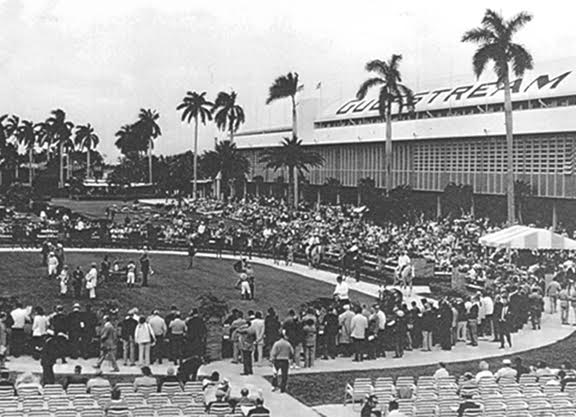
Gulfstream park photo
By Ben Massam
It was 1955, and Gulfstream Park was hitting its best stride. Rescued from insolvency just over a decade earlier by successful Scottish-born florist and entrepreneur James Donn, the beautifully landscaped South Florida racetrack steadily grew in popularity, routinely attracting record crowds for increasingly glamorous racing events–none more so than the Florida Derby.
The Mar. 26, 1955 running of the race christened the “Run for the Orchids”–a derivative of the storied “Run for the Roses” held at Churchill Downs six weeks later–featured Nashua, champion juvenile colt of 1954 and the de facto division leader after a win in the Flamingo S. at nearby Hialeah Park to begin his 3-year-old season. While much excitement surrounded the appearance and eventual victory of the celebrated colt, the festivities planned by Donn and his chief of staff Horace Wade extended far beyond the race itself.
In his coverage of the event for Sports Illustrated–which was in its first year of publication–horse racing editor Whitney Tower observed: “Florida Derby Day at Gulfstream was not entirely Nashua’s day. More properly, it might have been called Carnival Day, for probably no race in history has been preceded by more fanfare, buildup and pre-race festivities. Gulfstream opened its gates at 9 a.m., more than four hours before the first race and almost eight hours before the Derby itself…There was music from a dance orchestra and from the University of Miami band…a parade of state flags, trick riding exhibitions, baton twirling and…water skiing on the infield lake where tiny multicolored sailboats puffed lazily about. All this gaiety at Gulfstream’s biggest day…is the product of the imagination, ambition and energy of two men who have built Gulfstream into one of America’s premier race tracks.”
Sound familiar? Every racetracker knows that present day Gulfstream Park, a sun-drenched winter destination in the world of Thoroughbred racing, possesses a flare for the dramatic. Now in the hands of The Stronach Group, the Hallandale Beach oval features a 110-foot tall bronze Pegasus statue, a casino, a myriad of shopping and dining options and is poised to host its newly created $12-million GI Pegasus World Cup Invitational, the richest horse race in the world. While the Pegasus is unarguably a novel event, it is, in many ways, the logical extension of a longstanding tradition–one dating back to the 1940s–of pageantry and innovation at Gulfstream Park.
‘Donn’ of a New Beginning
Quite literally, the Pegasus–or Gulfstream as we know it–would not exist without the ingenuity of James Donn, Sr., who initially became associated with racetracks in South Florida as a landscaper. While Gulfstream opened with a roar on Feb. 1, 1939, attracting a robust crowd of 18,000 with local businesses closing for the occasion, the track failed to secure sufficient funding for the following cards and closed after only four days of operation. Even as the Gulfstream property sat empty and inoperative for four subsequent years, many continued to observe that the track had the potential to be an important destination on the calendars for sportsmen across the country.
“People come to Miami for sports [and] not as many would have come if they thought there would be no racing,” noted Allen T. Simmons, a well-heeled racing supporter and radio station operator from Akron, Ohio, in a 1943 article in the Daytona Beach Morning Journal. “Gulfstream Park is a fine plant.”
Donn recognized that potential sooner and more shrewdly than others, acquiring a majority interest in the track in 1943 and immediately acting to spruce up the facility ahead of the 1944 racing season. With a focus on developing the track as a destination for racetrack stalwarts and weekend thrill-seekers alike by pairing racing events with complementary festivities, Gulfstream experienced steady growth under Donn’s stewardship.
A December 1945 Associated Press report in the New York Times captured the disposition of the crowd and the flow of dollars-and-cents on yet another record-breaking day at the seaside track: “In a carnival mood, the racegoers poured $805,866 through the pari-mutuel windows on the nine-race card, nearly doubling the previous high of $409,209 set a year ago.”
During the 1950s, Donn and Wade continued to employ creative strategies to cultivate fans of the sport, including contests in which random patrons were selected as “temporary owners,” allowing racegoers to experience the thrill of watching a horse run under their own name. Without question, in the years before his death in 1972, Donn steered Gulfstream using many of the marketing and managerial principles that still guide the track today. In addition to creating Florida’s first $100,000 stakes race in the 1953 Florida Derby–and bolstering its commercial appeal with a circus-like atmosphere described as “racing’s greatest extravaganza”–Donn installed a cutting-edge clubhouse and introduced 10-race cards, packing as much racing action as possible into Florida’s relatively extensive southern-latitude daylight hours. In 1968, Gulfstream continued to be at the fore of entertainment innovation, hosting the Miami Pop Festival–one of the first large-scale outdoor music festivals in American history. The event, which took place on the track’s infield, was highlighted by a performance by Jimi Hendrix and served as a precursor to the fabled Woodstock festival, which took place in upstate New York the following year.
Gaining a Foothold
While Gulfstream undeniably flourished during Donn’s tenure at the helm, the broad history of the track must be painted against the unvarying backdrop of a battle to establish itself as the premier racing venue in South Florida. Facing stiff competition from Hialeah and Tropical Park closer to the Miami city center, the Hallandale track spent roughly 25 years stating its case in the Florida legislature to secure its share of racing dates during the January-to-April high tourist season, something that became a reality in 1972–ironically, the year of Donn’s death. With the favorable realignment of dates on the racing calendar, new Gulfstream president James Donn, Jr. was able to market his father’s extravagant event concept to a distinctively new pool of well-heeled customers in addition to mainstay Floridians.
“Chauffeur-driven cars discharged cargoes of affluent horseplayers outside the clubhouse entrance as Gulfstream opened a 40-day thoroughbred meeting in the calendar spot occupied since 1925 by Hialeah,” turf writer Steve Cady recalled in a New York Times piece describing the track’s January 1972 opening. “Gulfstream spiced its entertainment with bagpipers, high-diving acts and special exhibition races for elephants, ostriches and reindeer…The 330-acre sanctuary sparkled with 175,000 petunias, orchids, poinsettias and assorted other flowers and plants.”
Gulfstream’s innovations and success during the Donn years played a major role in its eventual propulsion to the top of the Florida racing heap. Never dull and ever-changing, the ensuing decades saw Gulfstream adapt and build upon time-tested strategies to appeal to the sensibilities of new generations of racegoers.
From the Breeders’ Cup to the Pegasus
In 1989, just one year before the Donn Family sold Gulfstream Park to Bertram Firestone, the track hosted its first of three Breeders’ Cups, a well-matched marriage between racing’s increasingly significant World Championships and a venue with a proven ability to shine on the grandest stage. Over 51,000 packed the building to witness the fourth and final meeting between rivals Sunday Silence and Easy Goer in the GI Classic, with the latter emerging victorious by a neck on the wire.
Six years later, Gulfstream played host to a coming out party of sorts for Hall of Famer Cigar, who prevailed in his first of two GI Donn Handicaps as part of a stunning 16-race win streak. The race was captured by three champions and two Hall of Famers in subsequent years before being re-appropriated for the Pegasus World Cup in 2017.
As the Pegasus nears, it is safe to say that its soon-to-be-written story will serve as the latest chapter in Gulfstream’s rich history and a fitting sequel to the track’s status as an innovation center over the past 70 years. Although the Donn Family is no longer nominally attached to the 1 1/8-mile Grade I event–and high-divers and racing elephants have been replaced by UFC champion Conor McGregor and a colossal Pegasus statue at the all-encompassing entertainment venue–Saturday’s event is unmistakably cast in the simultaneously pioneering and traditional mold of Jimmy Donn’s Gulfstream Park. Just as Nashua was the racing attraction on a day packed with festivities at the 1955 Florida Derby, the anticipation of a showdown between handicap stars Arrogate (Unbridled’s Song) and California Chrome (Lucky Pulpit) anchors a high-end celebration of the sport at its pinnacle in the 2017 Pegasus World Cup.
fonte : TDN
Op/Ed: The Pegasus: It Should Have Been 10 Furlongs
Tuesday, January 24, 2017 | Back to: Shared News

Arrogate & Chrome | Horsephotos
By Bill Finley
I like the GI Pegasus World Cup. I really do. It’s a bold, innovative concept and in its first go-round it accomplished something racing so rarely does: kept a couple of superstars in Arrogate (Unbridled’s Song) and California Chrome (Lucky Pulpit) in training. The rematch between the top two combatants from the GI Breeders’ Cup Classic never would have happened without this race, and it’s a tremendous coup. Arrogate-Chrome II alone makes this race a rousing success.
But with any new concept, particularly one as “outside the box” as this one is, you’re not going to get everything right right off the bat. The Stronach Group has as much as admitted that it will wipe the board clean after the inaugural running and see what they can do to make the event even better in the future. One distinct possibility is that it will head to Santa Anita next year, a facility much more suited for a big event than Gulfstream is.
There is plenty to consider as they look to the future, but nothing more important than fixing what is a major mistake that was made when planning for Saturday’s running of the $12 million race. Because of a severe post position bias at Gulfstream, this never should have been scheduled at a mile-and-an-eighth. The obvious distance for the race is the sport’s classic distance, a mile-and-a-quarter.
You might hear that the outside posts at Gulfstream for mile-and-an-eighth races aren’t that bad and that Big Brown (Boundary) won the nine-furlong GI Florida Derby in 2008 from post 12. These are alternate facts. The truth is that horses breaking from nine on out are at a big disadvantage. Their jockeys have two choices: they can rush them out of the gate and lose a lot of ground on the first turn or they can let the rest of the field break ahead of them and then drop to the inside, essentially giving the other horses a head start.
Courtesy of Equibase, here are the post position statistics for all mile-and-an-eighth dirt races run at Gulfstream since 2006.
Post Starters Winners Winning Percentage
1 292 48 16.4
2 292 38 14.5
3 292 54 20.6
4 292 41 14.0
5 288 35 12.1
6 271 30 11.0
7 216 23 10.6
8 161 13 8.0
9 100 3 3.0
10 63 4 6.3
11 36 2 5.5
12 18 1 5.5
13 3 0 0.0
14 3 0 0.0
The same problem exists for mile-and-a-sixteenth races, which also start at the finish line, but finish at the sixteenth-pole. Here are the Equibase stats for the mile-and-a-sixteenth races since 2006:
Post Starters Winners Winning Percentage
1 368 62 16.8
2 368 57 15.4
3 368 56 15.2
4 368 46 12.5
5 362 40 11.0
6 330 48 14.5
7 269 24 8.9
8 202 16 7.9
9 127 10 7.8
10 71 5 7.0
11 40 2 5.0
12 27 2 7.4
13 9 0 0.0
14 3 0 0.0
From Trakus we have more information, albeit from a limited sample. They took the last 13 mile-and-an-eighth dirt races run at Gulfstream in which there were nine starters or more. Horses breaking from the three inside posts traveled an average of 6,024.9 feet. Horses breaking from posts 10, 11 and 12 traveled an average of 6,049.2 feet. That may not seem like a lot, but it is. It is estimated that one length equals eight feet. Therefore, the three outside posts are at a three-length disadvantage when compared to the three inside posts.
Had Arrogate and California Chrome both drawn well and had three 50-1 shots been stuck in posts 10, 11 and 12, this wouldn’t be such a big deal. But the draw turned out to be the worst possible scenario as Arrogate drew the one post and California Chrome drew the 12. Arrogate has an unfair advantage over a rival that he already beat on a level playing field in the Breeders’ Cup Classic. Big Brown is the only horse in history to win a mile-and-an-eighth race from the 12 post since the Gulfstream track was reconfigured. But he did it against inferior rivals. California Chrome will have to do it against one of the best horses of this generation, not to mention some other fast horses. Unless Arrogate throws in a clunker, California Chrome has almost no chance of beating him, and that’s all because of the draw.
Horse racing, like life, isn’t always fair. Horses get bad posts all the time. But when $12 million is up for grabs and the entire purse is coming from payments made by the stakeholders, every effort possible should have been made to ensure as fair a race as possible. By holding the race at a mile-and-an-eighth, Gulfstream didn’t do that.
It’s too late for this year. And if the race does move to Santa Anita a mile-and-an-eighth will be fine because that is a one-mile track. But a mile-and-an-eighth Pegasus at Gulfstream? Never again.
fonte : TDN


